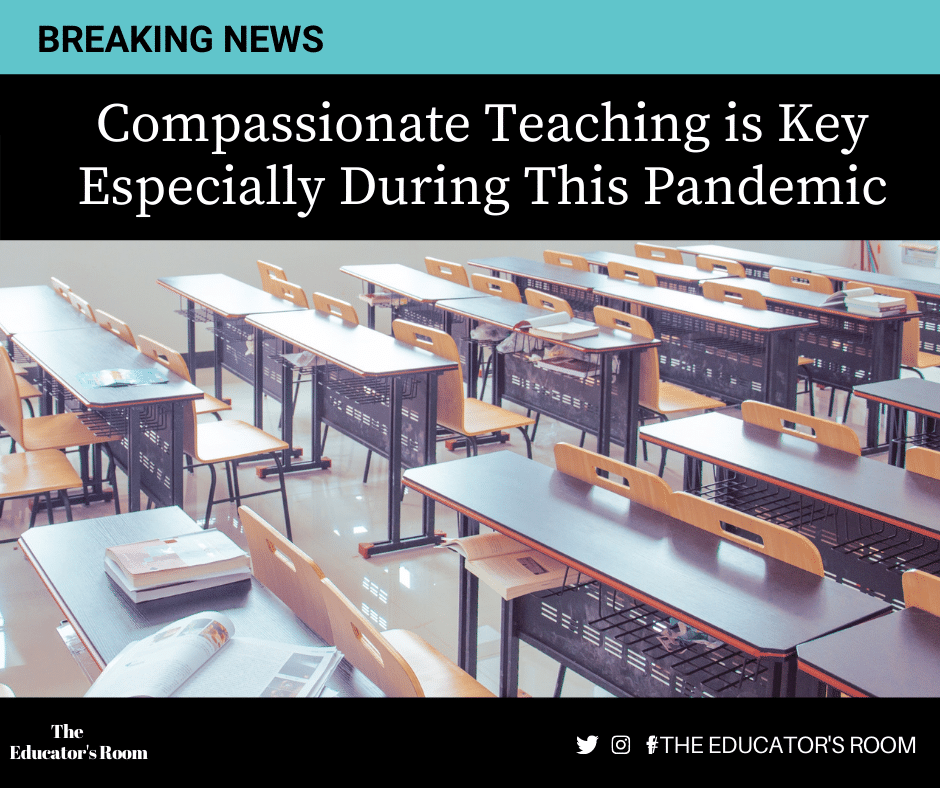Over the past few months, I’ve been noticing tweets from users about their teachers and their online class experiences. These two stood out to me in particular:
teachers be like "i know these are troubling times" then be the trouble during the times
— Jeffery Perkins (@JefferyxBball) November 29, 2020
A student just wrote “My grandmother died this morning. I’m not asking for any extensions. Just want you to understand why my posts may not seem as engaged. I don’t want you to think I don’t care about your class.”
— Heather Thompson Day (@HeatherTDay) April 13, 2020
What have we done to each other??
These tweets reveal several things but the main thing that stood out to me is that compassionate teaching is even more necessary during these uncertain times. While we may feel obligated to continue to create structure around our curriculum to meet our own deadlines, it is important to understand the severity of the experiences of our students who, like us, are dealing with stressful and hard circumstances right now. When we express that we understand and empathize with what they’re going through and then pile on projects, and assignments, we are inherently not genuine with our sentiments. Our words and our actions must align with one another during this time and our actions must ultimately be filled with compassion.
[bctt tweet=”We have to operate with compassion, and love even more so; our students need us to be patient, and understanding.” username=””]
Moving forward, we have to consider our every act intentionally.
As the first tweet showed us, teachers who continuously add projects and assignments onto an already packed schedule isn’t compassionate and isn’t actively thinking about the students’ wellbeing. Instead, we should be checking in with our students as much as possible. If you notice a student has been absent, reach out and ask if they need support (without being intrusive) and let them know you are there if needs be. Furthermore, we must be more vigilant about our tone in classes, interactions, and messages with students; our communication should be based on patience and consideration for our students (and this is best practice anyways and we should be doing this regardless but it’s especially important now). To be clear: a student doesn’t need extreme firmness and staunch tonality regarding a deadline when they are worried about surviving this pandemic.
They should not be scared to approach us for help, nor should they be worried about being penalized for not meeting our requirements. As the 2nd tweet revealed, students may be experiencing real and painful traumas right now for a variety of reasons and they are trying their best to cope given the circumstances and so we should create a space for them to succeed. Mental health is extremely important during this time. As such, persons, including our students, may be struggling with their own mental health.
According to Laura Hawryluck at the University of Toronto, persons who had longer durations of quarantine during the SARS outbreak between 2002-2004 in Toronto, Canada were associated with an increased prevalence of PTSD symptoms. Furthermore, acquaintance with or direct exposure to someone with a diagnosis of SARS was also associated with PTSD and depressive symptoms. Like SARS (which was more contained and had a lower death toll than COVID-19) and its effects on mental health, early reports & articles are reporting that COVID-19 may have long-lasting mental health effects such as anxiety, depression & PTSD on persons who have been diagnosed with COVID-19, those in isolation, frontline workers and those affected by the virus in other ways.
So, as teachers, we must prioritize the humanity of our students over our own goals/objectives. So, with work material, we must consciously think about the necessity of each assignment, and what we ask of our students during this time. We need to ask ourselves: will this add to the overall betterment of our students? Is this going to add undue stress during this time? Can my students do without this assignment?
In my own experience teaching online during this time, I’ve had students comment on the amount of work I’ve given them (again, in an attempt to still stick to our schedule despite what’s going on). Some students said they had work obligations that they still had to meet outside of school, and one student mentioned that they have to help their parents every day now that they’re home. It’s an obvious thing that we should consider the outside obligations of our students but it may slip our minds that our students already had complex and multifaceted lives, and their lives may have become more complicated by this pandemic. During this outbreak, some of your students:
- May be in different countries from their family e.g. international students
- May be extremely worried about their personal finances & jobs (e.g. covering rent, having a place to live, financially taking care of their families & children etc.)
- May have gotten sick themselves and/or
- May have lost family members and/or friends to COVID-19.
As such, schools can not compound the stress of student’s lives. So, ask them what they need from you during this time and use this as a guideline to restructure your teaching. They may be too overwhelmed to be able to fully articulate what they need and so you should be able to (based on the knowledge of your students that you’ve acquired thus far) determine some practices that would benefit them. You can:
- Reduce your class requirements so that only meaningful work is assigned,
- Relax or eliminate participation and attendance policies to relieve the pressure of students having to attend every lesson,
- Extend assignment timelines to provide more time for students to complete an assignment or task. So give students 2 weeks instead of 1 week to do an assignment etc.
- Provide a timeline of assignments ahead of time so that students are able to anticipate the work they will have left for a semester.
- Make their workload manageable – 13 assignments in one month is not manageable!
- Give student extensions on assignments if students need more time.
- Assign meaningful work, suggest readings/art/videos that may offer help and support to your students.
Overall, think of your students first and ensure your course and you as a teacher are teaching and living with compassion. Do not add to the pressures that our students have. Operate with love & care.






